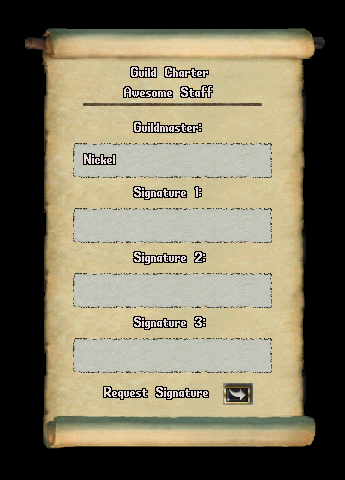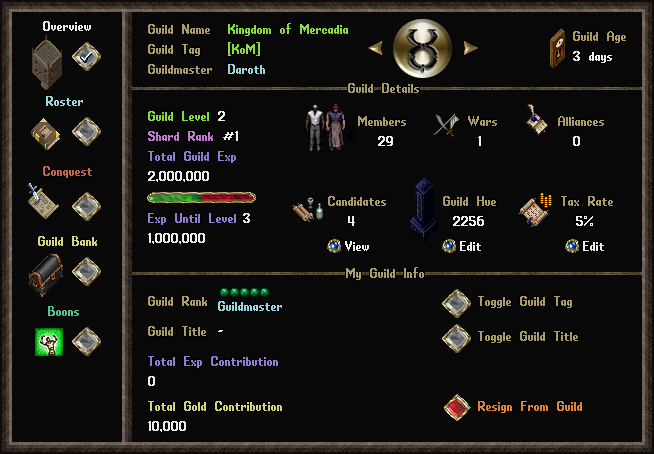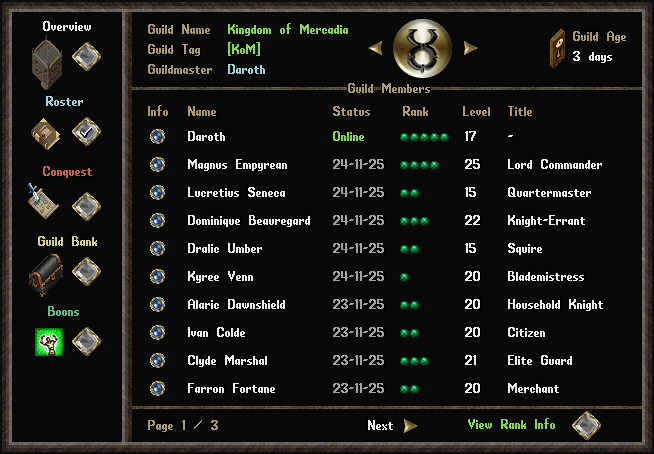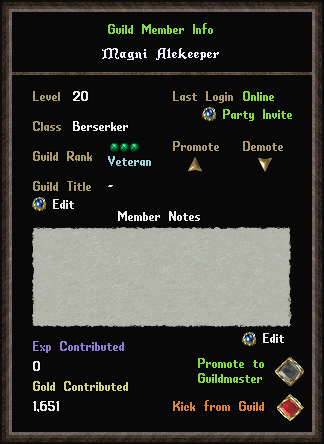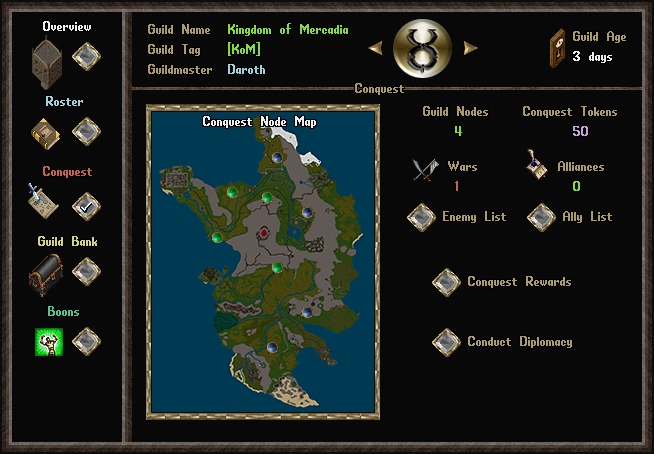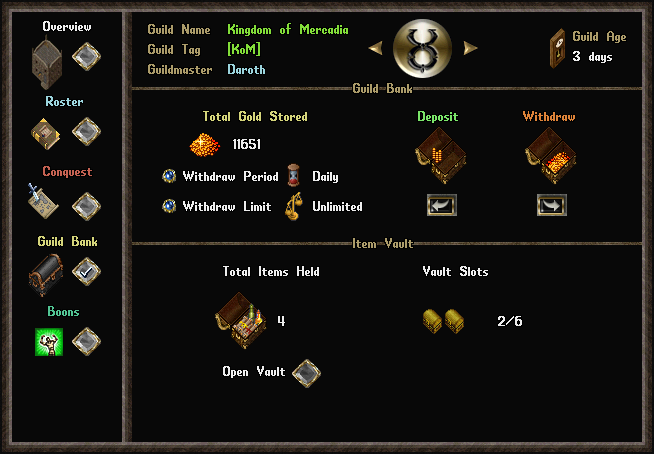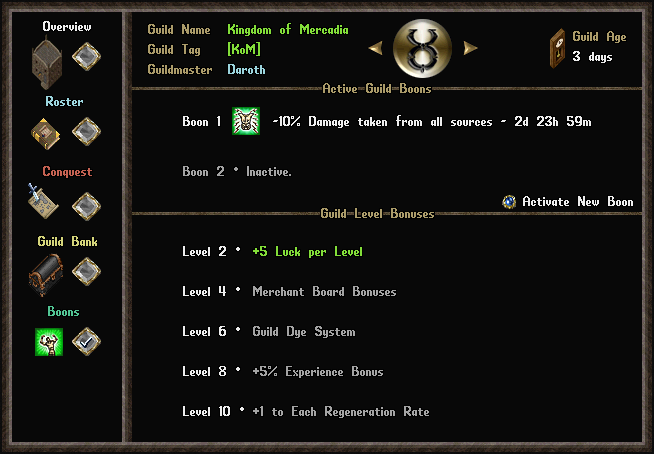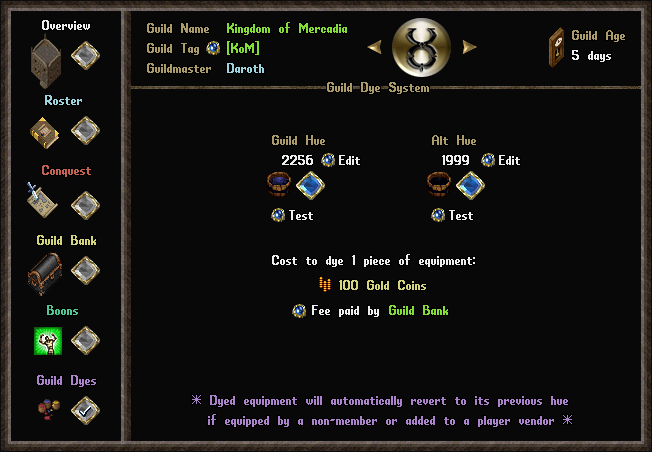Difference between revisions of "Guilds"
m (→Guilds) |
(→Guild Experience and Levels) |
||
| (79 intermediate revisions by 2 users not shown) | |||
| Line 3: | Line 3: | ||
[[Main Page]] | [[Main Page]] | ||
| − | = | + | =General Guild Info= |
| − | Guilds can be founded by purchasing a 'Guild Charter' from | + | == Creating a Guild == |
| + | Guilds can be founded by purchasing a 'Guild Charter' from a Banker NPC. | ||
| − | After | + | After a guild charter has been purchased, it must be signed by three players from unique accounts, and the guildmaster makes four. You cannot found a guild by signing the charter with your own characters. Once you have three additional signatures on your charter, you will be able to place a guild stone in a house that you own by using the Guild Charter. |
| + | |||
| + | * Be careful when entering a guild name, as this is permanent and cannot be changed after the Charter has been assigned a guild name | ||
[[File:charter.png]] | [[File:charter.png]] | ||
| − | * When you press 'Request Signature' if the targeted player accepts then they will be added to the charter. | + | * When you press 'Request Signature' if the targeted player accepts then they will be added to the charter |
| + | |||
| + | == Guild Experience and Levels == | ||
| + | |||
| + | When a guild member gains any experience, 15% of that experience is added to the guild's total value(this does not subtract any experience gained by the player). | ||
| + | |||
| + | {| class="wikitable" | ||
| + | ! colspan="8" | <span style="font-variant:small-caps"> Experience table </span> | ||
| + | |- | ||
| + | | Level | ||
| + | | '''Experience Points Required''' | ||
| + | |- | ||
| + | | '''1''' | ||
| + | | style="text-align:center; | 0 | ||
| + | |- | ||
| + | | '''2''' | ||
| + | | style="text-align:center; | 1,000,000 | ||
| + | |- | ||
| + | | '''3''' | ||
| + | | style="text-align:center; | 3,000,000 | ||
| + | |- | ||
| + | | '''4''' | ||
| + | | style="text-align:center; | 7,000,000 | ||
| + | |- | ||
| + | | '''5''' | ||
| + | | style="text-align:center; | 20,000,000 | ||
| + | |- | ||
| + | | '''6''' | ||
| + | | style="text-align:center; | 45,000,000 | ||
| + | |- | ||
| + | | '''7''' | ||
| + | | style="text-align:center; | 85,000,000 | ||
| + | |- | ||
| + | | '''8''' | ||
| + | | style="text-align:center; | 140,000,000 | ||
| + | |- | ||
| + | | '''9''' | ||
| + | | style="text-align:center; | 225,000,000 | ||
| + | |- | ||
| + | | '''10''' | ||
| + | | style="text-align:center; | 350,000,000 | ||
| + | |- | ||
| + | |} | ||
| + | |||
| + | ===Level Bonuses=== | ||
| + | |||
| + | ---- | ||
| + | |||
| + | '''Level 2 • Luck bonus''' | ||
| + | * Adds 5 base luck per guild level to every guild member | ||
| + | |||
| + | '''Level 4 • Merchant Guild bonuses''' | ||
| + | * When turning in a Supply Crate: +1000 exp, +20 renown, +50 gold | ||
| + | * When selling an item: +1 gold, +1 renown, +20 quota limit | ||
| + | |||
| + | '''Level 6 • Guild Dye System''' | ||
| + | * Unlocks access to the Guild Dye System, allowing members to dye equipment to their guild hue | ||
| + | |||
| + | '''Level 8 • +5% Experience Bonus''' | ||
| + | * Increases all experience gained by 5% | ||
| + | |||
| + | '''Level 10 • Improved Regeneration''' | ||
| + | * Adds +1 to Each Regeneration Rate | ||
| + | |||
| + | = Guild Gump = | ||
| + | |||
| + | == Overview == | ||
| + | The Guild Overview page displays various information about the guild, notably the guild's experience and level progression, tax rate, as well as the current number of candidates along with the option to view them. | ||
| + | |||
| + | [[File:GuildOverview.png]] | ||
| + | |||
| + | * Guild Hue - This is your guild's official hue which may only be set by the Guildmaster; guild hues are unique and once selected, no other guild may claim the same hue | ||
| + | * Tax Rate - This can be set by the Guildmaster to a value between 0%-20% and will skim that percentage of gold looted from ''creature corpses, treasure chests, SoS chests, and dungeon chests'' by guild members and add it directly to the Guild Bank | ||
| + | * "My Guild Info" displays information and button options unique to the member who is viewing the page | ||
| + | |||
| + | == Roster == | ||
| + | The Guild Roster page displays all members of the guild. Members are listed in order based on their last login date, with online members being listed first. | ||
| + | |||
| + | [[File:GuildRoster.png]] | ||
| + | |||
| + | * Each "Info" button will open the Member Info gump for the corresponding guild member | ||
| + | * The "View Rank Info" button will open a new page displaying the Guild's rank structure and which minimum rank is required to perform certain actions | ||
| + | |||
| + | == Member Info == | ||
| + | The Member Info gump will display all relevant character and guild information for the selected member | ||
| + | |||
| + | [[File:MemberInfo.png]] | ||
| + | |||
| + | * The option to send a Party Invite is present for all online members | ||
| + | * Members can add personal notes as a string of text(line breaks can be added using the html < br > code); this can be edited by the member, Officers, and the Guildmaster | ||
| + | * All experience and gold contributed by the member to the guild is visible here | ||
| + | * Button options for promotion/demotion, kick from guild, and edit title are only visible to members who meet the rank to access them | ||
| + | |||
| + | == Conquest == | ||
| + | |||
| + | The Conquest page is a section on the guild gump based around Conquest Nodes which includes new changes to Guild Alliance/Enemy functions - Guildmasters must decide whether they wish to enroll their guild into this system or not. Once enrolled, your guild is permanently part of the Conquest System. | ||
| + | |||
| + | '''Alliances''' - Allied guilds may aid in the capture or defense of Conquest Nodes and will also be awarded Conquest Tokens for nodes controlled by their allies; both guilds must initially agree to the alliance, if one guild breaks the alliance it is automatically broken for both guilds | ||
| + | |||
| + | '''Wars''' - Enemy guilds are able to openly fight each other without PvP enabled; if one Guild declares war on another it is automatically mutual and they are at war, both guilds must rescind their declaration of war to become neutral again | ||
| + | |||
| + | [[File:GuildConquest.png]] | ||
| + | |||
| + | * The Conquest Node Map indicates all in-game node locations and their status relative to your guild: green for your own/allied guilds, blue for neutral guilds, red for enemy guilds | ||
| + | * Buttons for Conquest Rewards and Conduct Diplomacy are only present for members who meet the minimum rank to use them | ||
| + | |||
| + | == Guild Bank == | ||
| + | The Guild Bank allows for the storage of gold and items for use by guild members. | ||
| + | |||
| + | [[File:GuildBank.png]] | ||
| + | |||
| + | * The Guildmaster can set a guild-wide Withdraw Period(the duration members must wait after withdrawing their gold limit) | ||
| + | * Withdraw Limits may be set by the Guildmaster for each guild rank | ||
| + | * The Item Vault allows storage of items through the use of Vault Compartment Slots; each guild begins with 1 slot and may unlock additional slots every 2 levels for a fee | ||
| + | * Vault Comparments may be re-named and have an access level assigned by guild rank | ||
| + | * Compartments hold up to 500 items each and have virtually no weight limit | ||
| + | |||
| + | == Boons == | ||
| + | The Boons page will display any active guild Boons as well as the current bonuses gained from guild level progression. Boons may be activated by the Guildmaster as well as Officers, and will last for a duration of 3 days. Boons affect all guild members. | ||
| + | |||
| + | [[File:GuildBoons.png]] | ||
| + | |||
| + | '''Available Boons:''' | ||
| + | |||
| + | |||
| + | [[File:Gump_30055.png]]''' +10% Damage output from all sources''' | ||
| + | |||
| + | |||
| + | [[File:Gump_30051.png]]''' -10% Damage taken from all sources''' | ||
| + | |||
| + | |||
| + | [[File:Gump_30035.png]] ''' +15% Gold increase when looting creatures/chests'''<br> | ||
| + | (Treasure chests, SoS chests, and locked dungeon chests) | ||
| + | |||
| + | |||
| + | [[File:Gump_30052.png]] ''' +1 Resources gathered, increased chance of smelting'''<br> | ||
| + | (+1 base resource per harvest, includes Herbalism up to Steelbloom) | ||
| + | <br> | ||
| + | (Makes smelting all ores 15% easier) | ||
| + | |||
| + | |||
| + | [[File:Gump_30011.png]] ''' +20% Increased guild experience gained''' | ||
| + | |||
| + | |||
| + | [[File:Gump_30013.png]] ''' Improved skill gain rate'''<br> | ||
| + | (Less than 70% skill: 25% increase)<br> | ||
| + | (Less than 90% skill: 20% increase) <br> | ||
| + | (Greater than 90% skill: 10% increase) | ||
| + | |||
| + | |||
| + | [[File:Gump_30030.png]] ''' Improved crafting success rate'''<br> | ||
| + | (Success rate: +10% base chance)<br> | ||
| + | (Exceptional: +10% of current chance)<br> | ||
| + | (Masterwork: +0.6% base chance)<br> | ||
| + | (Enhanced jewels: +2% base chance) | ||
| + | |||
| + | == Guild Dye System == | ||
| + | The Guild Dye System is unlocked at guild level 6 and allows all members to dye their equipment(weapons, armor and clothing) to either their guild hue or alt hue. | ||
| + | |||
| + | [[File:GuildDyeSystem.png]] | ||
| + | |||
| + | * The Guildmaster may edit the main/alt hues every 30 days | ||
| + | * The Guildmaster can toggle between Guild Bank or Member for fee payments | ||
| + | * If the Guild Bank does not have enough gold to pay the fee, the cost will default back to the Member | ||
| + | |||
| + | '''Guild Dye Restrictions:''' | ||
| + | * There is a limit of 3 items dyed per member every 24 hours, this is tracked in the gump | ||
| + | * Dyed equipment will automatically revert to its previous hue if equipped by a non-member or added to a player vendor | ||
| + | * Dyed equipment will automatically revert to its previous hue if its hue no longer matches your guild's main hue or alt hue | ||
| + | |||
| + | = Guild Rules and Conduct = | ||
| + | |||
| + | == Jump to Section == | ||
| + | [[#Guild Tags and Visibility|Guild Tags]] • | ||
| + | [[#Roleplay Etiquette|Roleplay Etiquette]] • | ||
| + | [[#Dispute Resolution|Disputes and Staff Arbitration]] • | ||
| + | [[#Consequences|Consequences]] | ||
| + | |||
| + | ---- | ||
| + | |||
| + | == Guild Tags and Visibility == | ||
| + | Guild tags are considered '''visible insignia or markings''' that identify your character’s allegiance. | ||
| + | How this appears in-game is up to you—crests, tabards, jewelry, tattoos, or other symbols—but if you have your guild tag turned on, from a role-play standpoint **it must be visible** unless your character is actively using the `]conceal` feature. | ||
| + | |||
| + | Keep in mind: | ||
| + | * Tags do not represent literal abbreviations. For example, a character of the *Kingdom of Arandor* does not wear “KoA” on their armor, and Kingdom of Mercadia characters do not have KoM stamped on their wrist. Instead, others would see a recognizable mark, color, or emblem associated with that group. | ||
| + | * This means other players can interpret or recognize the insignia in-character, though not necessarily understand it's *meaning* unless their character has reason to. | ||
| + | * If your tag is visible, your affiliation is considered *known* in RP. If you wish to hide it, use `]conceal` or turn it off in the guild menu. | ||
| + | * Some nations ban the use of concealment, as such you can optionally choose to use services in an unincorporated town | ||
| + | |||
| + | ---- | ||
| + | |||
| + | == Roleplay Etiquette == | ||
| + | Guilds are a cornerstone of community storytelling. To keep the experience immersive and fair: | ||
| + | * '''Do not metagame.''' Seeing a guild tag over someone’s head is an OOC mechanic; it must be interpreted through RP as a symbol or mark. | ||
| + | * '''Respect faction dynamics.''' Some guilds are allies, others enemies—let that enrich the world rather than create OOC friction. | ||
| + | * '''Do not use guilds as personal armies or griefing tools.''' Guilds represent organizations, not extensions of player grudges. | ||
| + | * ''Be mindful of tone.'' The world is dangerous and political, but hostility in-character should not spill over OOC. | ||
| + | |||
| + | ---- | ||
| + | |||
| + | == Dispute Resolution == | ||
| + | If you find yourself in a conflict—political, territorial, or personal—remember: | ||
| + | * Try to resolve it in-character first. Roleplay should be the first line of resolution. | ||
| + | * Communicate OOC before escalation. Most misunderstandings come from mismatched expectations. | ||
| + | * Involve staff only when necessary. Staff are volunteers, not referees for every disagreement. | ||
| + | |||
| + | If disputes escalate beyond amicable resolution, staff may intervene with narrative control. This may include: | ||
| + | * Dissolution of the guild in-game. | ||
| + | * Character death of those involved. | ||
| + | * Removal of leadership privileges or guild structures. | ||
| + | |||
| + | ---- | ||
| + | |||
| + | == Consequences == | ||
| + | These rules exist because guild-related disputes tend to create unnecessary drama that harms the community and forces staff to intervene. | ||
| + | |||
| + | If you cannot find ways to amicably resolve conflicts or accept that actions have consequences, understand that staff may act decisively to protect the health of the shard. You can always approach staff with concerns, and they may even have suggestions. | ||
| + | |||
| + | Staff actions may include: | ||
| + | * Narrative Dissolution – the guild is removed from canon and deleted mechanically. | ||
| + | * Character Deaths – characters involved may be permanently killed as part of narrative cleanup. | ||
| + | * Account Sanctions – repeated or deliberate OOC disruption can result in reforging or permanent bans. | ||
| + | |||
| + | This is a volunteer project. Staff are not paid to babysit or mediate endless disputes. | ||
| + | As roleplayers, you are expected to bring a measure of maturity and the ability to suspend disbelief for the sake of shared storytelling. | ||
| + | |||
| + | ---- | ||
| + | |||
| + | ''These rules exist to ensure fair play, reduce friction, and protect the integrity of Regisfall’s world. Treat them not as restrictions, but as a framework for better, more consistent roleplay.'' | ||
| + | |||
| − | = | + | =Frequently Asked Questions= |
| − | + | ''How do I rename my guild?'' | |
| + | * Guilds cannot be renamed. If you wish to change your guild’s name for roleplay reasons or otherwise, you must disband the guild and create a new one. Staff will only assist with renaming if a mistake was made during the guild’s initial creation. | ||
| − | |||
| − | + | ''Can I have my guildstone moved to a town building or prominent location?'' | |
| + | * No. Guildstones must be placed within a house owned by the guildmaster that is subject to decay, even if the guild is the only one operating within a town or nation. | ||
| − | |||
| − | + | ''Can I apply to be a Nation Guild?'' | |
| + | * “Nation Guilds” were a legacy feature and no longer exist. All guilds in Regisfall operate on equal footing with regard to leadership eligibility, as outlined in our [[Factions and NPC Leadership]] guidelines and on this page. Multiple guilds may now jointly lead a Nation by working together as an alliance. | ||
| − | |||
| − | + | ''How can my guild help with the leadership of a nation and acquire a Nation Stone?'' | |
| + | * [[Nations | Nation Stones]] are limited to a maximum of four per nation and must be earned through roleplay that supports your guild’s formal appointment as a governing body within that nation. Guilds do not automatically receive an appointment simply by being the only guild present within a nation. | ||
Latest revision as of 04:44, 5 January 2026
General Guild Info
Creating a Guild
Guilds can be founded by purchasing a 'Guild Charter' from a Banker NPC.
After a guild charter has been purchased, it must be signed by three players from unique accounts, and the guildmaster makes four. You cannot found a guild by signing the charter with your own characters. Once you have three additional signatures on your charter, you will be able to place a guild stone in a house that you own by using the Guild Charter.
- Be careful when entering a guild name, as this is permanent and cannot be changed after the Charter has been assigned a guild name
- When you press 'Request Signature' if the targeted player accepts then they will be added to the charter
Guild Experience and Levels
When a guild member gains any experience, 15% of that experience is added to the guild's total value(this does not subtract any experience gained by the player).
| Experience table | |||||||
|---|---|---|---|---|---|---|---|
| Level | Experience Points Required | ||||||
| 1 | 0 | ||||||
| 2 | 1,000,000 | ||||||
| 3 | 3,000,000 | ||||||
| 4 | 7,000,000 | ||||||
| 5 | 20,000,000 | ||||||
| 6 | 45,000,000 | ||||||
| 7 | 85,000,000 | ||||||
| 8 | 140,000,000 | ||||||
| 9 | 225,000,000 | ||||||
| 10 | 350,000,000 | ||||||
Level Bonuses
Level 2 • Luck bonus
- Adds 5 base luck per guild level to every guild member
Level 4 • Merchant Guild bonuses
- When turning in a Supply Crate: +1000 exp, +20 renown, +50 gold
- When selling an item: +1 gold, +1 renown, +20 quota limit
Level 6 • Guild Dye System
- Unlocks access to the Guild Dye System, allowing members to dye equipment to their guild hue
Level 8 • +5% Experience Bonus
- Increases all experience gained by 5%
Level 10 • Improved Regeneration
- Adds +1 to Each Regeneration Rate
Guild Gump
Overview
The Guild Overview page displays various information about the guild, notably the guild's experience and level progression, tax rate, as well as the current number of candidates along with the option to view them.
- Guild Hue - This is your guild's official hue which may only be set by the Guildmaster; guild hues are unique and once selected, no other guild may claim the same hue
- Tax Rate - This can be set by the Guildmaster to a value between 0%-20% and will skim that percentage of gold looted from creature corpses, treasure chests, SoS chests, and dungeon chests by guild members and add it directly to the Guild Bank
- "My Guild Info" displays information and button options unique to the member who is viewing the page
Roster
The Guild Roster page displays all members of the guild. Members are listed in order based on their last login date, with online members being listed first.
- Each "Info" button will open the Member Info gump for the corresponding guild member
- The "View Rank Info" button will open a new page displaying the Guild's rank structure and which minimum rank is required to perform certain actions
Member Info
The Member Info gump will display all relevant character and guild information for the selected member
- The option to send a Party Invite is present for all online members
- Members can add personal notes as a string of text(line breaks can be added using the html < br > code); this can be edited by the member, Officers, and the Guildmaster
- All experience and gold contributed by the member to the guild is visible here
- Button options for promotion/demotion, kick from guild, and edit title are only visible to members who meet the rank to access them
Conquest
The Conquest page is a section on the guild gump based around Conquest Nodes which includes new changes to Guild Alliance/Enemy functions - Guildmasters must decide whether they wish to enroll their guild into this system or not. Once enrolled, your guild is permanently part of the Conquest System.
Alliances - Allied guilds may aid in the capture or defense of Conquest Nodes and will also be awarded Conquest Tokens for nodes controlled by their allies; both guilds must initially agree to the alliance, if one guild breaks the alliance it is automatically broken for both guilds
Wars - Enemy guilds are able to openly fight each other without PvP enabled; if one Guild declares war on another it is automatically mutual and they are at war, both guilds must rescind their declaration of war to become neutral again
- The Conquest Node Map indicates all in-game node locations and their status relative to your guild: green for your own/allied guilds, blue for neutral guilds, red for enemy guilds
- Buttons for Conquest Rewards and Conduct Diplomacy are only present for members who meet the minimum rank to use them
Guild Bank
The Guild Bank allows for the storage of gold and items for use by guild members.
- The Guildmaster can set a guild-wide Withdraw Period(the duration members must wait after withdrawing their gold limit)
- Withdraw Limits may be set by the Guildmaster for each guild rank
- The Item Vault allows storage of items through the use of Vault Compartment Slots; each guild begins with 1 slot and may unlock additional slots every 2 levels for a fee
- Vault Comparments may be re-named and have an access level assigned by guild rank
- Compartments hold up to 500 items each and have virtually no weight limit
Boons
The Boons page will display any active guild Boons as well as the current bonuses gained from guild level progression. Boons may be activated by the Guildmaster as well as Officers, and will last for a duration of 3 days. Boons affect all guild members.
Available Boons:
![]() +10% Damage output from all sources
+10% Damage output from all sources
![]() -10% Damage taken from all sources
-10% Damage taken from all sources
![]() +15% Gold increase when looting creatures/chests
+15% Gold increase when looting creatures/chests
(Treasure chests, SoS chests, and locked dungeon chests)
![]() +1 Resources gathered, increased chance of smelting
+1 Resources gathered, increased chance of smelting
(+1 base resource per harvest, includes Herbalism up to Steelbloom)
(Makes smelting all ores 15% easier)
![]() +20% Increased guild experience gained
+20% Increased guild experience gained
![]() Improved skill gain rate
Improved skill gain rate
(Less than 70% skill: 25% increase)
(Less than 90% skill: 20% increase)
(Greater than 90% skill: 10% increase)
![]() Improved crafting success rate
Improved crafting success rate
(Success rate: +10% base chance)
(Exceptional: +10% of current chance)
(Masterwork: +0.6% base chance)
(Enhanced jewels: +2% base chance)
Guild Dye System
The Guild Dye System is unlocked at guild level 6 and allows all members to dye their equipment(weapons, armor and clothing) to either their guild hue or alt hue.
- The Guildmaster may edit the main/alt hues every 30 days
- The Guildmaster can toggle between Guild Bank or Member for fee payments
- If the Guild Bank does not have enough gold to pay the fee, the cost will default back to the Member
Guild Dye Restrictions:
- There is a limit of 3 items dyed per member every 24 hours, this is tracked in the gump
- Dyed equipment will automatically revert to its previous hue if equipped by a non-member or added to a player vendor
- Dyed equipment will automatically revert to its previous hue if its hue no longer matches your guild's main hue or alt hue
Guild Rules and Conduct
Jump to Section
Guild Tags • Roleplay Etiquette • Disputes and Staff Arbitration • Consequences
Guild Tags and Visibility
Guild tags are considered visible insignia or markings that identify your character’s allegiance. How this appears in-game is up to you—crests, tabards, jewelry, tattoos, or other symbols—but if you have your guild tag turned on, from a role-play standpoint **it must be visible** unless your character is actively using the `]conceal` feature.
Keep in mind:
- Tags do not represent literal abbreviations. For example, a character of the *Kingdom of Arandor* does not wear “KoA” on their armor, and Kingdom of Mercadia characters do not have KoM stamped on their wrist. Instead, others would see a recognizable mark, color, or emblem associated with that group.
- This means other players can interpret or recognize the insignia in-character, though not necessarily understand it's *meaning* unless their character has reason to.
- If your tag is visible, your affiliation is considered *known* in RP. If you wish to hide it, use `]conceal` or turn it off in the guild menu.
- Some nations ban the use of concealment, as such you can optionally choose to use services in an unincorporated town
Roleplay Etiquette
Guilds are a cornerstone of community storytelling. To keep the experience immersive and fair:
- Do not metagame. Seeing a guild tag over someone’s head is an OOC mechanic; it must be interpreted through RP as a symbol or mark.
- Respect faction dynamics. Some guilds are allies, others enemies—let that enrich the world rather than create OOC friction.
- Do not use guilds as personal armies or griefing tools. Guilds represent organizations, not extensions of player grudges.
- Be mindful of tone. The world is dangerous and political, but hostility in-character should not spill over OOC.
Dispute Resolution
If you find yourself in a conflict—political, territorial, or personal—remember:
- Try to resolve it in-character first. Roleplay should be the first line of resolution.
- Communicate OOC before escalation. Most misunderstandings come from mismatched expectations.
- Involve staff only when necessary. Staff are volunteers, not referees for every disagreement.
If disputes escalate beyond amicable resolution, staff may intervene with narrative control. This may include:
- Dissolution of the guild in-game.
- Character death of those involved.
- Removal of leadership privileges or guild structures.
Consequences
These rules exist because guild-related disputes tend to create unnecessary drama that harms the community and forces staff to intervene.
If you cannot find ways to amicably resolve conflicts or accept that actions have consequences, understand that staff may act decisively to protect the health of the shard. You can always approach staff with concerns, and they may even have suggestions.
Staff actions may include:
- Narrative Dissolution – the guild is removed from canon and deleted mechanically.
- Character Deaths – characters involved may be permanently killed as part of narrative cleanup.
- Account Sanctions – repeated or deliberate OOC disruption can result in reforging or permanent bans.
This is a volunteer project. Staff are not paid to babysit or mediate endless disputes. As roleplayers, you are expected to bring a measure of maturity and the ability to suspend disbelief for the sake of shared storytelling.
These rules exist to ensure fair play, reduce friction, and protect the integrity of Regisfall’s world. Treat them not as restrictions, but as a framework for better, more consistent roleplay.
Frequently Asked Questions
How do I rename my guild?
- Guilds cannot be renamed. If you wish to change your guild’s name for roleplay reasons or otherwise, you must disband the guild and create a new one. Staff will only assist with renaming if a mistake was made during the guild’s initial creation.
Can I have my guildstone moved to a town building or prominent location?
- No. Guildstones must be placed within a house owned by the guildmaster that is subject to decay, even if the guild is the only one operating within a town or nation.
Can I apply to be a Nation Guild?
- “Nation Guilds” were a legacy feature and no longer exist. All guilds in Regisfall operate on equal footing with regard to leadership eligibility, as outlined in our Factions and NPC Leadership guidelines and on this page. Multiple guilds may now jointly lead a Nation by working together as an alliance.
How can my guild help with the leadership of a nation and acquire a Nation Stone?
- Nation Stones are limited to a maximum of four per nation and must be earned through roleplay that supports your guild’s formal appointment as a governing body within that nation. Guilds do not automatically receive an appointment simply by being the only guild present within a nation.
